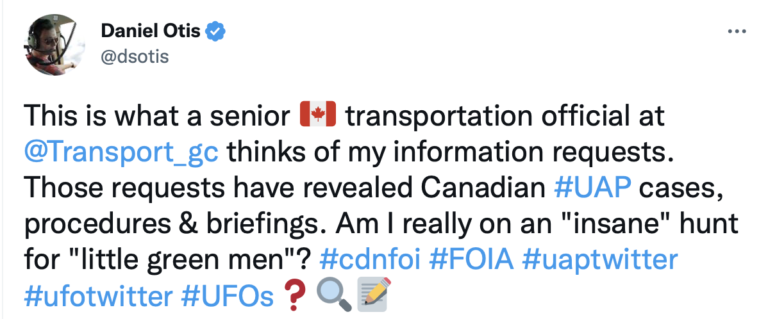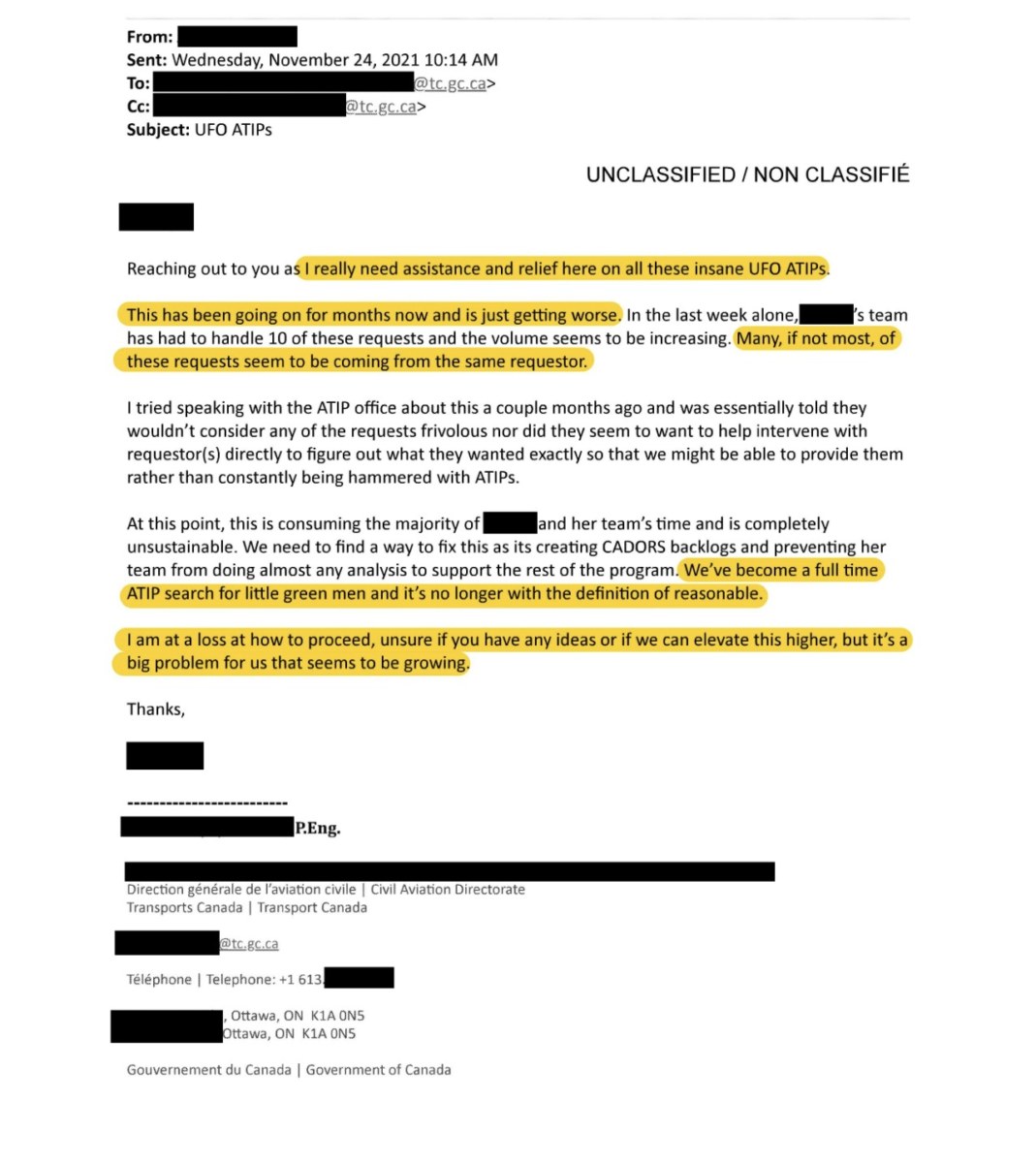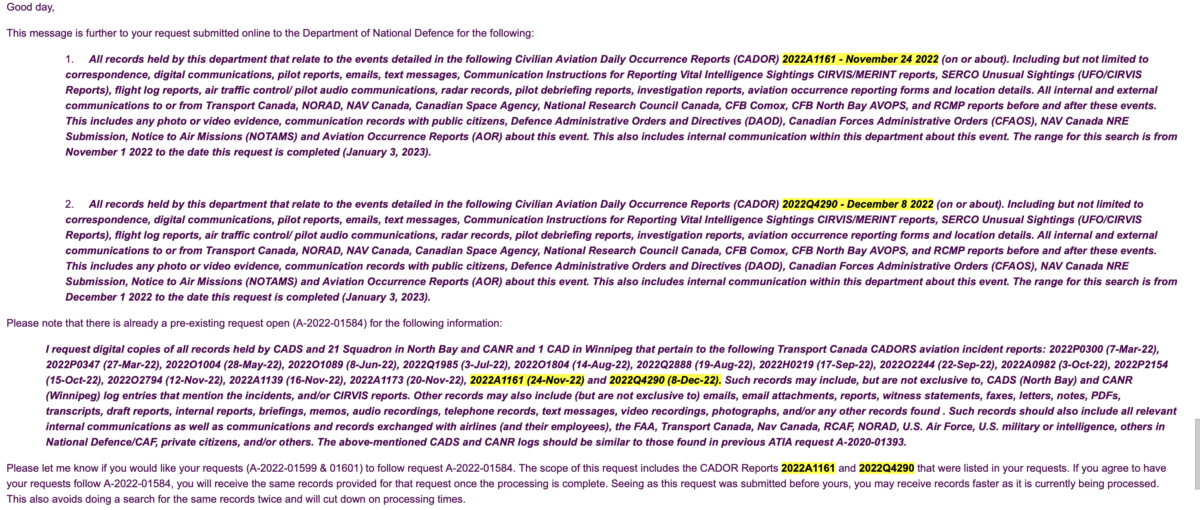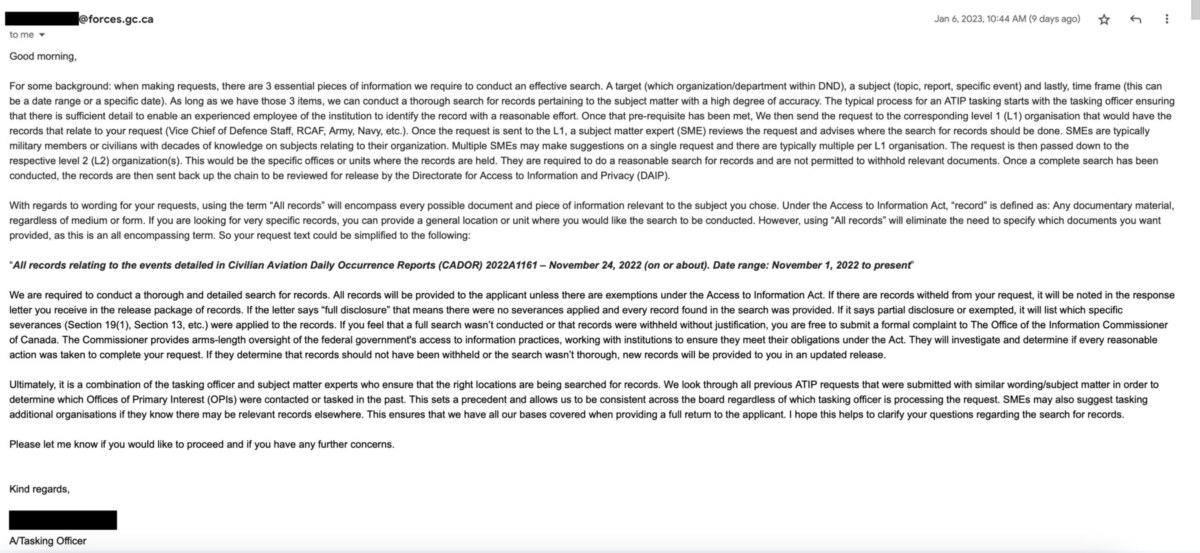Access to Information From Our Canadian Government is Easier Than You May Think

In the wake of the recent UAP Report published by the American Office of the Director of National Intelligence on Thursday, January 12, 2023, there appears to be silence among UFO and UAP communities. If you browse underground channels, like #UFOTWITTER and read social comments from those involved in the conversation, you will notice a change in the overall tone of discussions.
Over the years, I have witnessed various social media debates on the accuracy of American UFO/UAP evidence reported by mainstream media outlets. People argue over the same facts while projecting two different options, yet the evidence has stayed the same. People have resorted to doxing and, in some extreme cases, launching an exposĂ© into people’s personal lives, which often turns into a “turf” war with UFO/UAP cyberbullies.
I’ve witnessed many intelligent and otherwise forthright people, turn sour while defending their version of their truth. I’ve seen people on the proverbial mountain get knocked down after years of climbing because of personal judgments and the misrepresentation of facts presented.
I have spoken to some ring leaders on both sides of this equation to understand why they are the way they are. On one side, there is hope, empowerment, and a focus on educating the public about their version of the truth. On the other side, there is pain, suffering and a complete disregard for trust in their political leaders and government.
I used to think this was a “UFO American Problem,” but now I see the same in Canada.
Many reasons over the years can lead us all to conclude that our world’s governments can not be trusted collectively and individually. Does this mean we can never trust them again? Could we trust them with anything, if not everything? Most importantly, do we have all the information to formulate a factual and accurate conclusion?
In many cases, we don’t, so we push for answers.
Access to the information process is easy if you trust the system; otherwise, it is not. The firm reality is that we have to use the system to gain access to the information we request. We must trust that our government will search and provide all information they have collected and respect the reasons they redact information. If you can trust that, then this process is easy.
The main issue observed in response to others requesting the information is that they share beliefs that information is being withheld or that the redacted information implies a cover-up. Is it possible they are not happy with what they got and are just projecting disappointment?
From the ATI department’s perspective, they did their job. They provided what we asked for. Yet, many don’t believe they are telling the truth in those instances. Remember, correlation does not mean causation, and the absence of evidence doesn’t imply an omission of evidence.
On December 27th, 2022, a very credible and well-respected Canadian Journalist, Daniel Otis, shared a copy of a document he received during an ATI request on his Twitter account. This document was an internal conversation between departments that expressed frustration over the abundance of ATI requests from UFO reports. Otis stated in this tweet,
“This is what a senior transportation official at @Transport_gc (Transport Canada) thinks of my information requests. Those requests have revealed Canadian UAP cases, procedures & briefings. Am I on an “insane” hunt for “little green men?”Â

Otis has been openly public in the Canadian UFO circuit since his debut article published on VICE Canada on April 12 2021Â , and thus is the origin story of how we met. Two years before this article, I posted a never before seen declassified document to the world that proved that the interest in UFOs in Canada still existed. It was the first of many CIRVIS documents to come. Â As great as that was, it fell on deaf ears. No, no one understood the seriousness of this document. Canada has UFO, and Canada investigates!Â
The day this article came out, I immediately recognized the document Otis referenced. It was my document, the same as mentioned above. He found the article just by browsing previously released documents. He had to know the way of knowing he requested it before he wrote the article, but he knew what he was looking at, and he knew it needed to be out in public.
Otis did what I couldn’t do and gave the message to the world. I reached out to him, introduced myself, and thanked him for the article. We compared notes, I gave him pointers on how to obtain these particular documents, and then we parted ways.Â
Since then, he has written several articles on the subject matter and was eventually able to get this topic on CTV news. Â He has done an excellent service in getting this message out to the public.
I think this context is essential because when I saw this tweet from Otis, I felt that this pursuit was getting to him.
“Am I really on an “insane” hunt for “little green men”?
 Otis said in his December 27th, 2022 tweet. What was said in this document that made him take offence?

Above is an exact copy of the document posted by Daniel Otis on December 27th, 2022, to which he was referring when he made his statement. According to Otis, the redacted items are the personal contact information of the individuals involved to protect their identities. Otis created the highlighted parts to emphasize the point he was trying to convey.
 I understand his perspective on this. However, after reading this document, I started to believe that his tweet, although justified, was an emotional response to which he took offence.Â
When I read the document, I got a different perspective. The writer appears to be expressing frustration as an employee responsible for fulfilling these tasks. Their first sentence outlines the document’s purpose:Â
“Reaching out to you as I really need assistance and relief on all these insane UFO ATIPS.”
The word insane was used as a personal judgment of the writer’s opinion on this part of their job, while the remainder of the statement explains why help has been requested. With words like, Â
“This has been going on for months now, and it is just getting worse.”, “Many, if not most, of these, seem to come from the same requestor.” and “We’ve become a full-time ATIP search for little green men and it is no longer with the definition of reasonable.”
expresses the views, opinions and apparent frustrations of this senior official who has been fielding complaints from their colleagues tasked with fulfilling UFO-specific ATI requests. Which is confirmed by the writer’s ending statement:
“I am at a loss at how to proceed, unsure if you have any ideas or if we can elevate this higher, but it is a big problem for us that seems to be growing.”
In this situation, who is right and who is wrong? Which statements come from the reasonable mind? Which comes from the emotional mind? Most importantly, where is the wise mind?
According to an article written by Guelph Therapist Greg Dorter, an explanation of the Wise Mind is as described as:
“the synthesis of reasonable mind and emotional mind. It’s where these two states of mind overlap. It takes into account both the rational and emotion, our logic and our feelings. It’s practical and sensitive to how we feel. It’s lets us see the whole picture and think and act in ways that are reasonable while remaining true to ourselves and our nature.”
We often use an exercise involving the use of a wise mind for experiencers who appear to be negatively affected by the phenomenon.Â
If we were to review the above two examples between Otis and a member of Transport Canada, it appears that this wise mind was not present at the time of these writings. Â
Are they at fault? No. Two perspectives, from two different people with two different focuses, and both trying to complete a mission.
I understand the perspective of both in this situation, and when appropriate, I can relate to how each of them feels, and I can forgive what appears to be an emotionally misleading assumption that the Transport Canada employee was targeting Otis directly. Â In reality, this employee was speaking in general, in confidence, to their superior. I request ATIs constantly and daily; maybe the TC employee was talking about me. Who knows?Â
I recently engaged with ATI employees from Transport Canada and the Department of National Defence to find a middle path. I have since learned from several task advisors that they are now grouping requests together if the request is for the same event due to the recent volume of UFO-specific submissions. Â
For example, say someone completes an ATI today, and I complete mine tomorrow for the same event, I will get an email asking my permission to group it with another request already being processed. This strategy makes it easier for the taskers to duplicate the request, and depending on the timeframe, it could also speed the process up.Â
An example of this is seen below:

Points number 1 and number 2 are my requests verbatim. The pre-existing request example clearly shows that the requester asked for the same events. If I accept the change, then I will get the documents at the same time the previous requester gets them. Sounds efficient and easy, but are there any problems with this?
If you compare my requests to those below, they are almost identical but also different. And because they are different, the discretion of the task advisor may change based on the individual wording. So what would the right choice be? Trust the language of the other requester that they checked all the boxes and listed all the possibilities of where the documents may be. Or do you trust your judgment and have them process a separate report? Â The convenience I have seen here is time. If I agree, I will get the documents faster.Â
Because the requester isn’t identified, I cannot tell the need for the request and the plans intended with the information provided in the documents. The requestor’s information is confidential, which I appreciate because many others will receive my wording for consideration. But therein lies another potential issue. If this document is part of a story for a journalist, and if I post it online before they write their article, there is a significant chance that the journalist won’t be able to write their story because their editors may require original content.Â
Another problem is that these requests cost $5.00 each and if someone else requested it and both paid for it, then the Departments make double the money by grouping the requests. Some might have concerns with this. I don’t particularly care.
The major problem is the unwillingness to work together officially.Â
The vast majority of those I have encountered in this Canadian/American UFO circuit thus far appear only to be interested in self-fulfillment, personal secrecy, and financial gain. Â Because of this, I anticipate a lot of misplaced hate and anger brewing aboard.Â
Just because these characteristics exist does not mean their intentions are not pure. It may further justify the emotions exhibited when they believe there is more going on than what can be proven. This validates the feelings. But it doesn’t make them accurate.
Would it be reasonable to suggest that the Transport Canada employee’s frustration is reasonable? How do we remedy the situation, especially when the majority requesting parties apply direct pressure and aggression in hopes of receiving what they request on a strong unproven belief that they have been lied to?
To help get that answer, I asked a DND tasking advisor how I could make our lives easier during this ATI request process and how I could trust that by requesting ALL records, without being specific, I would actually obtain all records. His answer is below:

The Tasking Officer states:
“when making requests, there are 3 essential pieces of information we require to conduct an effective search. A target (which organization/department within DND), a subject (topic, report, specific event) and lastly, time frame (this can be a date range or a specific date). As long as we have those 3 items, we can conduct a thorough search for records pertaining to the subject matter with a high degree of accuracy. “
“The typical process for an ATIP tasking starts with the tasking officer ensuring that there is sufficient detail to enable an experienced employee of the institution to identify the record with a reasonable effort. Once that pre-requisite has been met, We then send the request to the corresponding level 1 (L1) organisation that would have the records that relate to your request (Vice Chief of Defence Staff, RCAF, Army, Navy, etc.). Once the request is sent to the L1, a subject matter expert (SME) reviews the request and advises where the search for records should be done. SMEs are typically military members or civilians with decades of knowledge on subjects relating to their organization. Multiple SMEs may make suggestions on a single request and there are typically multiple per L1 organisation. The request is then passed down to the respective level 2 (L2) organization(s). This would be the specific offices or units where the records are held. They are required to do a reasonable search for records and are not permitted to withhold relevant documents. Once a complete search has been conducted, the records are then sent back up the chain to be reviewed for release by the Directorate for Access to Information and Privacy (DAIP).”
“With regards to wording for your requests, using the term “All records” will encompass every possible document and piece of information relevant to the subject you chose. Under the Access to Information Act, “record” is defined as: Any documentary material, regardless of medium or form. If you are looking for very specific records, you can provide a general location or unit where you would like the search to be conducted. However, using “All records” will eliminate the need to specify which documents you want provided, as this is an all encompassing term. So your request text could be simplified to the following:
“All records relating to the events detailed in Civilian Aviation Daily Occurrence Reports (CADOR) 2022A1161 – November 24, 2022 (on or about). Date range: November 1, 2022 to present”
It turns out that the secret is to be simple. He further writes:
“We are required to conduct a thorough and detailed search for records. All records will be provided to the applicant unless there are exemptions under the Access to Information Act. If there are records witheld from your request, it will be noted in the response letter you receive in the release package of records. If the letter says “full disclosure” that means there were no severances applied and every record found in the search was provided. If it says partial disclosure or exempted, it will list which specific severances (Section 19(1), Section 13, etc.) were applied to the records. If you feel that a full search wasn’t conducted or that records were withheld without justification, you are free to submit a formal complaint to The Office of the Information Commissioner of Canada. The Commissioner provides arms-length oversight of the federal government’s access to information practices, working with institutions to ensure they meet their obligations under the Act. They will investigate and determine if every reasonable action was taken to complete your request. If they determine that records should not have been withheld or the search wasn’t thorough, new records will be provided to you in an updated release.”
Â
“Ultimately, it is a combination of the tasking officer and subject matter experts who ensure that the right locations are being searched for records. We look through all previous ATIP requests that were submitted with similar wording/subject matter in order to determine which Offices of Primary Interest (OPIs) were contacted or tasked in the past. This sets a precedent and allows us to be consistent across the board regardless of which tasking officer is processing the request. SMEs may also suggest tasking additional organisations if they know there may be relevant records elsewhere. This ensures that we have all our bases covered when providing a full return to the applicant. I hope this helps to clarify your questions regarding the search for records.”
In conclusion, overall, our government has felt pressure from increased reports involving UFOS in Canada. There is evidence of internal communication to discuss efficiency so they can adhere to this change. In many ways, this is a win, but we must remember that the people inside the government are people too. Particular people have access to the information and have the choice of whether or not to reveal that to the general public. The last thing we want to do is bite the hand that feeds us.
I have since used the simple basic wording, “All records relating to the events detailed in Civilian Aviation Daily Occurrence Reports (CADOR) 2022A1161 – November 24, 2022 (on or about). Date range: November 1, 2022 to present” in replace of my giant catch-all response. The results have been the same and a small part of trust has been established.
This ladies and gentlemen, is an example of Wise Mind.
#HeedTheWorld




